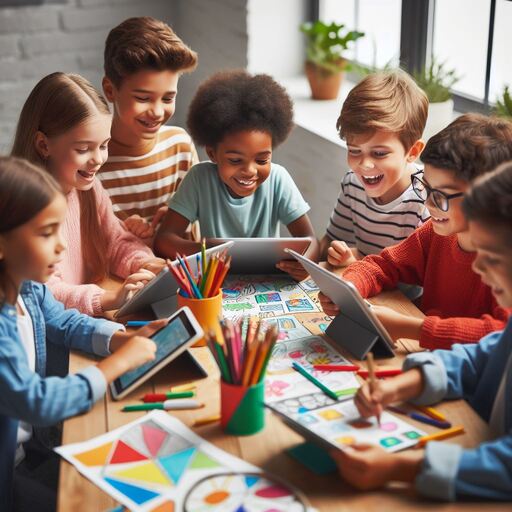In the digital age, collaboration and communication skills are vital for success in both academic and professional settings. Children’s tablets offer a unique opportunity to foster these essential skills through engaging group projects. By working together on collaborative tasks, children can learn to share ideas, solve problems, and communicate effectively with their peers. In this article, we explore the significance of fostering collaboration and communication through group projects on children’s tablets and provide insights into how to facilitate successful collaborative experiences.

The Importance of Fostering Collaboration and Communication:
Fostering collaboration and communication skills in children is essential for several reasons:
- Teamwork: Collaboration teaches children the importance of working together as a team to achieve common goals. By collaborating on group projects, children learn to share responsibilities, support each other, and celebrate collective achievements.
- Problem-Solving: Group projects provide children with opportunities to tackle complex problems and find creative solutions through brainstorming, critical thinking, and experimentation. Collaboration fosters resilience and adaptability as children learn to overcome challenges together.
- Communication Skills: Collaborative projects require effective communication skills such as active listening, clear articulation, and respectful interaction. By communicating with their peers, children learn to express their ideas, listen to others’ perspectives, and negotiate differences constructively.
- Empathy and Understanding: Collaboration encourages empathy and understanding as children learn to consider others’ viewpoints, respect diverse opinions, and work collaboratively towards common objectives. Collaboration promotes inclusivity, empathy, and appreciation for diversity.
- Real-World Preparedness: Collaboration and communication skills are essential for success in the modern workplace and society. By fostering these skills from a young age, children are better prepared to navigate social interactions, collaborate effectively, and contribute meaningfully to their communities and future careers.
See price for Fire HD 10 Kids Tablet (32GB, Sky Blue) + Kids Stylus https://amzn.to/497An78
Group Projects on Children’s Tablets:
Group projects on children’s tablets offer a dynamic and interactive platform for collaborative learning experiences. These projects can encompass a wide range of topics, from academic subjects such as math and science to creative endeavors such as storytelling and multimedia production. Here are some examples of group projects that can be facilitated on children’s tablets:
- Collaborative Storytelling: Children can work together to create original stories, poems, or scripts using storytelling apps or multimedia platforms. Each child can contribute ideas, characters, settings, and plot twists, fostering creativity and collaboration.
- STEM Challenges: Children can engage in STEM (science, technology, engineering, and mathematics) challenges that require teamwork, problem-solving, and critical thinking skills. Projects may include building structures, designing experiments, or solving engineering puzzles using educational apps or interactive simulations.
- Virtual Field Trips: Children can embark on virtual field trips to explore historical landmarks, natural wonders, or cultural sites using educational apps or virtual reality experiences. Group projects may involve researching destinations, planning itineraries, and presenting findings to classmates.
- Digital Presentations: Children can collaborate on digital presentations or multimedia projects using presentation apps, graphic design tools, or video editing software. Group projects may involve researching topics, creating visuals, and delivering presentations to peers or parents.
- Coding Challenges: Children can collaborate on coding projects that require problem-solving, computational thinking, and creativity. Coding apps or platforms allow children to work together to design and code interactive games, animations, or apps, fostering teamwork and innovation.
See price for DOOGEE T10 Android Tablet 2K HD 10.1 inch, 8+7GB RAM 128GB ROM(TF 1TB), Octa-Core Android 12 OS, Battery 8300mAh, 2.4/5G WiFi&Bluetooth 5.0, 13MP+8MP Camera, TÜV Low Bluelight Tablet for Kids (Blue) https://amzn.to/3vzxhLb
Facilitating Successful Collaborative Experiences:
To facilitate successful collaborative experiences on children’s tablets, consider the following strategies:
- Establish Clear Objectives: Clearly define the goals, expectations, and parameters of the group project to ensure that all participants understand their roles and responsibilities.
- Promote Equity and Inclusion: Encourage all children to actively participate and contribute to the group project, regardless of their background, skills, or experience. Foster a culture of inclusivity, respect, and appreciation for diverse perspectives.
- Provide Guidance and Support: Offer guidance, support, and scaffolding as needed to help children navigate the collaborative process, solve problems, and overcome challenges. Be available to answer questions, offer feedback, and facilitate discussions.
- Encourage Reflection and Feedback: Encourage children to reflect on their collaborative experiences and provide feedback to each other. Promote self-assessment, peer evaluation, and constructive feedback to foster continuous improvement and growth.
- Celebrate Achievements: Celebrate the achievements, progress, and contributions of each group member to reinforce a sense of accomplishment and teamwork. Recognize and acknowledge the value of collaboration in achieving shared goals.
See price for Fire HD 10 Kids Tablet (32GB, Disney Mickey Mouse) + Kids Headset https://amzn.to/4asMT1Q
Conclusion:
Fostering collaboration and communication skills through group projects on children’s tablets is essential for preparing children for success in the digital age and beyond. By engaging in collaborative learning experiences, children develop teamwork, problem-solving, and communication skills that are essential for academic achievement, social development, and future career success. As parents, educators, and caregivers, we have the opportunity to leverage the power of children’s tablets to facilitate meaningful and engaging collaborative experiences that empower children to work together, learn from each other, and achieve shared goals. Through collaborative projects, we can nurture the next generation of collaborative leaders, innovators, and changemakers who are equipped to thrive in a rapidly evolving world.

